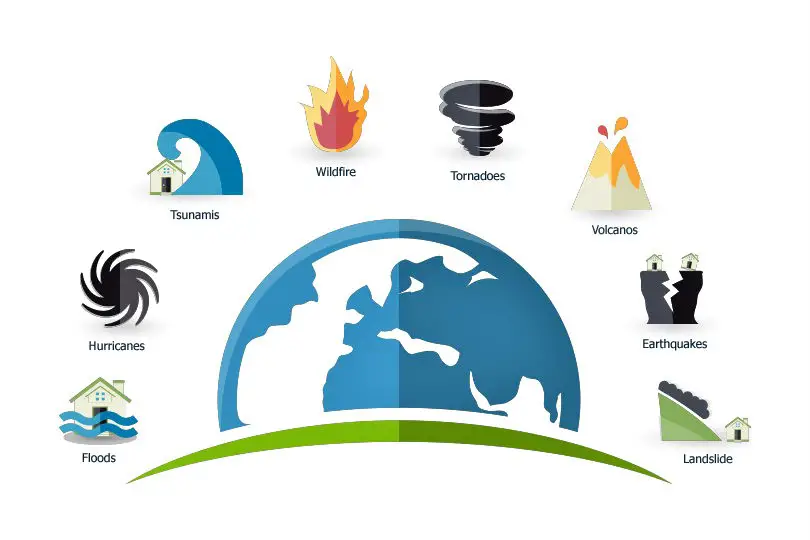Natural disasters strike unexpectedly, leaving behind a trail of destruction that can be both emotionally and financially overwhelming. In such times, having the right insurance coverage can make all the difference. This comprehensive guide explores six types of insurance that can help you navigate the aftermath of natural disasters, providing the necessary financial support to rebuild and recover.
Homeowners Insurance: Shielding Your Haven
Your home is more than just a structure; it’s your sanctuary. Homeowners insurance goes beyond covering just the physical structure – it safeguards your belongings, provides liability coverage, and often extends to additional living expenses if disaster forces you to temporarily relocate.
Flood Insurance: Staying Afloat in Troubled Waters
Standard homeowners insurance typically doesn’t cover flood damage. To safeguard your property against flooding caused by heavy rains, storm surges, or melting snow, you’ll need a separate flood insurance policy. This policy ensures you’re not left high and dry when waters rise.
Earthquake Insurance: Securing Against the Quakes
For those living in earthquake-prone regions, earthquake insurance is a must. This coverage assists in repairing your home and replacing belongings damaged by seismic activity, helping you rebuild your life on solid ground.
Windstorm and Hurricane Insurance: Weathering the Storm
High winds and hurricanes can cause significant damage to your property. Windstorm and hurricane insurance steps in to cover repairs and replacements, helping you recover swiftly when nature unleashes its fury.
Wildfire Insurance: Safeguarding Against the Blaze
In fire-prone areas, wildfire insurance is essential. It provides financial protection for your property and possessions in the event of a wildfire. Given the increasing frequency of wildfires, this coverage is becoming crucial for homeowners in many regions.
Business Interruption Insurance: Resuming Operations After Disaster
Strikes
Natural disasters don’t just impact homes; they can halt business operations too. Business interruption insurance offers coverage for lost income and ongoing expenses if your business is forced to close temporarily due to a covered disaster. This allows you to get back on your feet without the burden of lost revenue.
FAQs:
Is renters insurance sufficient for protecting my belongings in a natural
disaster?
A: Renters insurance covers personal belongings but might not include natural disasters. Consider additional coverage for comprehensive protection.
What factors influence the cost of flood insurance?
A: Flood insurance costs are determined by factors like your property’s location, flood risk, and the level of coverage you choose.
Can I buy earthquake insurance if I don’t live in a high-risk area?
A: Yes, earthquake insurance is available in various regions. Assess the risk and potential impact to decide if it’s right for you.
Does homeowners insurance cover tree damage caused by storms?
A: Yes, standard homeowners insurance often covers tree damage if it damages the insured property or blocks access.
Is wildfire insurance only for homes in rural areas?
A: Wildfires can affect urban areas too. Evaluate the risk and consult with an insurance professional to determine the coverage you need.
How soon can I expect to receive business interruption insurance benefits?
A: Benefit payout timing depends on the terms of your policy. Some policies have waiting periods, so review the details carefully.
Can I modify my insurance coverage after purchasing a policy?
A: Yes, you can adjust your coverage based on changing needs. Keep in mind that modifications might have limitations and waiting periods.
Are there government assistance programs for disaster recovery?
A: Government aid is available in certain situations, but it might not cover all expenses. Insurance offers a more comprehensive financial safety net.
What’s the difference between replacement cost and actual cash value?
A: Replacement cost coverage reimburses you for the cost of replacing items, while actual cash value coverage considers depreciation, so you receive less.
How can I assess the risk of natural disasters in my area?
A: Consult local resources, such as FEMA flood maps and geological surveys, to understand the potential risks in your region.
Conclusion
Investing in the right insurance policies can provide a crucial safety net during times of natural disaster. From protecting your home and belongings to ensuring your business can recover swiftly, these insurance options offer financial security and peace of mind. Remember, while we can’t control the occurrence of natural disasters, we can certainly control our preparedness for them. Take the necessary steps today to secure a better tomorrow.
